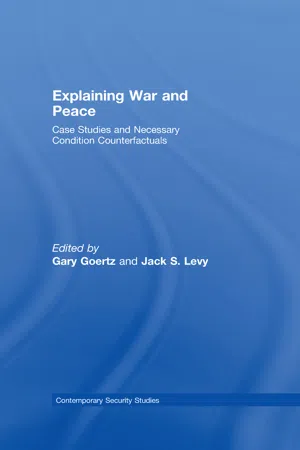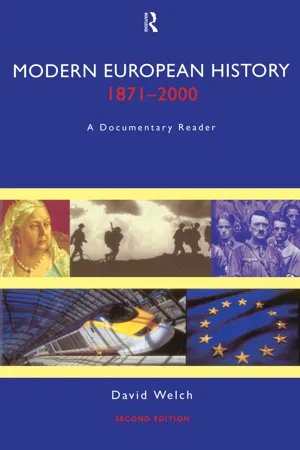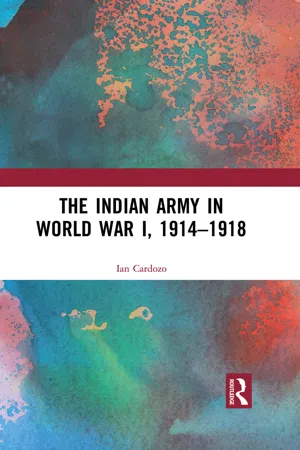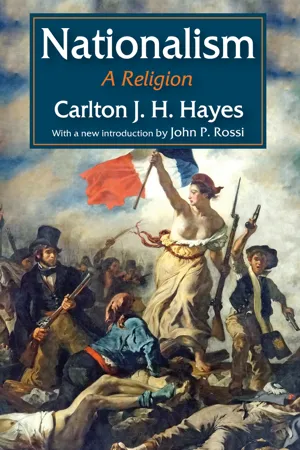Causes of WWI
The causes of WWI can be attributed to a complex web of factors, including militarism, alliances, imperialism, and nationalism. Tensions between major powers in Europe, particularly the rivalry between Germany and Britain, played a significant role in the outbreak of the war. The assassination of Archduke Franz Ferdinand of Austria-Hungary in 1914 acted as a catalyst, leading to the declaration of war.
8 Key excerpts on "Causes of WWI"
- eBook - ePub
Explaining War and Peace
Case Studies and Necessary Condition Counterfactuals
- Jack Levy, Gary Goertz(Authors)
- 2007(Publication Date)
- Routledge(Publisher)
...It was contingent in both its underlying and immediate causes. Historians have proposed a variety of underlying causes for World War I, including social Darwinism, nationalism, the alliance structure and shifts in the balance of power. But what made Europe ripe for war was not the multitude of alleged causes, but the nature of the interactions among them. World War I is best understood as a nonlinear confluence of three largely independent chains of causation. These chains produced independent but more or less simultaneous gestalt shifts in Vienna and Berlin, and a slightly earlier one in Russia. Had the timing of the Austrian and German shifts been off by as little as two years, Austrian leaders would not have felt so intent on destroying Serbia or German leaders would not have been so willing to encourage them to do so. For this reason alone, World War I was overdetermined and highly contingent. Theoretical explanations for war take catalysts for granted. If the right underlying conditions are present, some incident will sooner or later set armies on the march the way the twin assassinations at Sarajevo did in 1914. But Sarajevo was not just any provocation; it met a diverse set of political and psychological requirements that were essential for Austrian and German leaders to risk war. It is possible, but extremely unlikely, that some other provocation would have met these conditions, or that some other combination of great powers would have started a war for different reasons. In the absence of a catalyst, several more years of peace could have altered the strategic and domestic contexts of the great powers to have made war less likely. There was a two year window when the leaders of at least two great powers thought their national or dynastic interests were better served by war than peace. Social scientists often assume that major social and political developments are specific instances of strong, or even weak, regularities in social behavior...
- eBook - ePub
Modern European History, 1871-2000
A Documentary Reader
- David Welch(Author)
- 2020(Publication Date)
- Routledge(Publisher)
...4 The origins of the First World War and its aftermath On 28 June 1914 Archduke Franz Ferdinand, heir to the Austrian throne, was murdered in Sarajevo in Bosnia, which had been annexed by Austria in 1908. The assassin and his co-conspirators were members of a Serbian nationalist group called ‘the Black Hand’. In less than five weeks the alliance systems of the great powers had turned this local incident into a European war. The origins of the First World War are a source of major historical controversy that has refused to disappear over the years. The historiographical debate must, therefore, inform any discussion about the events that ‘triggered’ a European and then a world war in 1914. The origins of the war can be analysed in many different ways, but any attempt to explain its origins must take into account the immediate causes of the war and the long-standing reasons for instability and international tension in Europe. The list of general causes would include the colonial conflicts and the scramble for overseas possessions; the building up of new alliances and the formation of two power blocs; the escalation of the arms race; and the increasing conflicts in the Balkans. Although the documents included in the first part of this chapter are generally related to the immediate causes of the war, they are intended to illuminate some of the wider issues as well. The illusions with which the First World War began all stemmed from the belief that it would be a short, clinical and controllable war (‘It’ll all be over by Christmas’)...
- eBook - ePub
- Preston Jones(Author)
- 2013(Publication Date)
- Research & Education Association(Publisher)
...As Germany’s navy grew, for example, the British strove to maintain superiority. This international competition was partly spurred by social Darwinism. In August 1914 war broke out in Europe long after many came to believe that it was inevitable. Another cause of the war was the fact that Europe had not seen a lengthy and costly war since the final defeat of Napoleon in 1815. Prussia and France had fought a war in 1870 (the Franco-Prussian War), but it ended quickly and did not cause loss of life on a scale anywhere near what Europe would experience in the early twentieth century. Britain’s war against the Boers of South Africa was costly, but it was also far removed from Europe. This meant that, for many, war had become romanticized. In 1914 it seemed a good way for a young man to bring glory on himself, to have a good time, to be a hero. When war was declared in August 1914, middle-class young men throughout Europe enthusiastically volunteered to fight, believing that the war would be over by Christmas. At the same time, many Europeans feared that their populations were growing morally soft, that they simply enjoyed the fruits of the empires their fathers had built. A little war, many thought, would be a good way to toughen up the young. Still another very important cause of the war was nationalism in central Europe. Germany’s main ally, the Austro-Hungarian Empire, comprised not only speakers of German and Magyar (Hungarian) but also Czechs, Slovenians, and Serbs who wanted independent nations. The nation of Serbia sympathized with and assisted Serb nationalists in Austria-Hungary. This brings us to the trigger of the First World War: the assassination of the Austrian Archduke Franz Ferdinand (1863–1914) by Serbian nationalists. Austria believed that the assassins had been assisted by Serbia, and when Serbia declined to meet Austria’s demands (which essentially would have placed Serbia under Austrian control), Austria declared war on Serbia (July 28)...
- Antony Best, Jussi M. Hanhimäki, Joseph A. Maiolo, Kirsten E. Schulze(Authors)
- 2014(Publication Date)
- Routledge(Publisher)
...Still others look to miscalculation, misperception, accident, fear or simply the lust for conquest. Whatever approach they may select, scholars often examine the interaction between two sets of causes: long-term causes (or conditions) which made a war probable and the immediate causes and decisions which triggered a particular war at a particular moment. What follows is divided between a discussion of some long-term causes and then a look at how events moved to spark war in the summer of 1914. One important condition was the system of Great Power alliances and alignments. Overly rigid alliances prevented the ‘proper’ functioning of the balance of power, so the usual argument goes, and ensured that what might have been an isolated crisis in the Balkans became a general war. Certainly, from 1900 onwards, Europe was increasingly split into two coalitions: Germany and Austria-Hungary (the Central Powers) were bound by the 1879 Dual Alliance to support each other ‘with the whole strength of their empires’ if Russia attacked, and Italy joined in 1882 to form the Triple Alliance; France and Russia closed ranks in 1891–94 to counter the German–Austrian alliance, and Britain settled its imperial disputes with France in 1904 and with Russia in 1907. However, it is easy to exaggerate the point, for these alliances remained flexible enough to permit the Powers to withhold diplomatic and military support in order to exert a restraining influence on a partner, especially, as was so often the case, if no common interests were at stake. Britain remained the least committed. Italy remained neutral in 1914 and went to war on the side of the Entente Powers in 1915. Up until 1912–13, Berlin withheld its support for Austria in the Balkans and advised caution. The real importance of the alliance system was the way in which the alliances and alignments were transformed into something very different from what their makers had intended...
- eBook - ePub
- Ian Cardozo(Author)
- 2019(Publication Date)
- Routledge(Publisher)
...Chapter 1 Causes and Events that Led to World War I: Footfalls of History Do not go to war without knowing how it ends ANONYMOUS FROM THE BEGINNING to the middle of the nineteenth century, countries in Europe maintained a balance of power that helped to keep the peace and to prevent wars involving two or more countries. Despite this effort, the growing rivalry between France and Prussia for the mastery of Europe was moving towards criticality. In July 1870 war broke out between France and Prussia. The war ended in 1871 resulting in a victory for the Prussians and the unification of Germany. By terms of the peace treaty, France had to surrender the eastern state of Alsace and much of Lorraine. This period could be considered as the start of the rise of Germany’s ambition to become a world power. It also resulted in a burning desire by France to avenge its defeat and to recover its lost territories. Around this time, the Ottoman Empire was breaking up. Turkey was considered to be the ‘Sick Man of Europe’ and became fair game for major and minor European powers to help themselves by armed force during the First and Second Balkan wars to annex large portions of the Ottoman Empire. Egypt and Cyprus went to Britain, Morocco and Tunis went to France, Tripoli (Libya) went to Italy and Bosnia-Herzegovina went to Austria-Hungary. All these events, particularly the last, resulted in putting the Balkan states in turmoil. The struggle for the Balkans, however, did not end with the cessation of hostilities. Russia, Serbia and the Hapsburgs still contended for control over the Balkans. Russia wanted dominance over the Slavs, Austria-Hungary wanted to be a bridge to the East through the Balkans, and Serbia wanted access to the sea...
- eBook - ePub
War, Peace and International Relations
An introduction to strategic history
- Colin S. Gray(Author)
- 2013(Publication Date)
- Routledge(Publisher)
...6 World War I, I Controversies Reader's guide : Controversies about World War I. The scale of the conflict. Casualties. Introduction: the making of the twentieth century With black humour, one could argue that the Great War of 1914–18 was the kind of conflict that gives war a bad name. War should be an instrument of policy; Clausewitz is crystal clear on that fundamental. However, once the basic decisions to fight were taken, for four and a quarter years warfare seemed more in command of the policies of states than commanded by them. That was not quite true, but nor was it wholly an illusion. The strategic historian takes serious note of Gary Sheffield's expansive claim that ‘The First World War was the key event of the twentieth century, from which everything else flowed’ (Sheffield, 2001: 221). Sheffield is persuasive, provided one does not take too literally his assertion that ‘everything else flowed’ from the war. One has to beware of such a vague concept as the flow of events – sometimes events seem to trickle lazily, at other times they appear to rest, while they have also been known to reverse direction as in ‘a turning tide’. While there is no doubt that in many vital respects the Great War made the twentieth century, certainly politically and strategically, there is good reason to question the responsibility of the war for all that followed over the next eighty years. It is plausible to claim that the Great War against France which concluded in 1815 had reshaped, even redefined, international politics for at least a half-century. Similarly, it is scarcely less persuasive to argue that Bismarck's wars to unite Germany under Prussian tutelage and for Prussia's benefit reconstructed the architecture of the balance of power. The German Chancellor decisively altered the way that international politics would have to be managed by the great powers. Now the temporal domain of the strategic historical argument needs to be extended...
- eBook - ePub
Nationalism
A Religion
- Frans A.M. Alting von Geusau, Frans A.M. Alting von Geusau(Authors)
- 2017(Publication Date)
- Routledge(Publisher)
...9 Nationalism, Cause and Result of World War I 1. National Versus Imperial States in Eastern Europe By the start of the present century, progress had been made in redrawing the political map of Europe along lines of nationality. In addition to the older national states on the Atlantic seaboard, there were now national states in central Europe for Italians and Germans and in the southeast for Greeks, Serbs, Rumanians, and Bulgarians. In other words, national states had become the prevalent form of government throughout full half of the Continent. These, as I have pointed out in the preceding chapter, might not include the whole of a nationality, and in fact they might contain some dissentient national minorities, but each had as its core and dominant majority a people with distinctive speech and traditions. The situation in most of eastern Europe was different and equivocal. Here were a large number of nationalities, with intensifying cultural nationalism, but without national states of their own and subjected to one or another of three surviving empires—the Russian, the Ottoman, or the Austrian. The Russian Empire was an approximation to the national states of western Europe in that a single nationality (the “Great Russian”) constituted a majority of its inhabitants and shared a common patriotism. Nevertheless its subject nationalities, especially those in the Empire’s western provinces and in the Caucasus, resented the “Russification” applied by the Tsar’s government, and their leaders could be counted upon to sympathize and cooperate with revolutionary movements aimed against the autocratic imperial regime. The Austrian Empire, or, as it was now officially called, the Dual Monarchy of Austria-Hungary, was an outstanding example, in east-central Europe, of the imperial, nonnational state. It contained a hodgepodge of nationalities...
- eBook - ePub
American Stories
Living American History: v. 2: From 1865
- Jason Ripper(Author)
- 2015(Publication Date)
- Routledge(Publisher)
...(If, by the way, you rinse with “Listerine,” you have a swish of Joseph Lister’s name in your mouth.) After the Spanish-American War in Cuba, an American doctor named Walter Reed (the namesake for the military hospital in Washington, DC) drained swamps to remove mosquito habitat, finally offering relief from yellow fever, a terrifying virus. This knowledge allowed U.S. doctors and engineers in Panama in 1904 to complete the canal where the French had failed twenty years before. Under microscopes, the invisible workings of the natural world could be reduced to their smallest components and then interpreted as elaborate theories, like genetic evolution. France discarded its Catholic-run primary schools in favor of a secular education system. Understanding would derive from logic and literature, not from church doctrine. While continentals absorbed Sigmund Freud’s dream interpretations, Karl Marx’s explanations of the role of economics in history, and Albert Einstein’s mind-bending dissertations on light particles and relative reality, art galleries and symphonies flourished. Pointillist painters re-imagined the pastel romanticism of impressionist gardens and parasol strolls by the Seine in a dot-by-dot rendering of the world. Civilization was in full bloom. With disease on the run, space and time unfolding their secrets, and a profound movement toward citizen participation in government (throughout western Europe at least)—with progress an act rather than a mere word—with what seemed a dawning age of permanent summer and perpetual sunshine, why did Europeans try to destroy each other? The Causes of World War I in Europe By 1914, Europe was a madhouse. In England, 2,250 “noble” families owned almost 50 percent of all the farmland, while 1,700 people owned 90 percent in Scotland...







